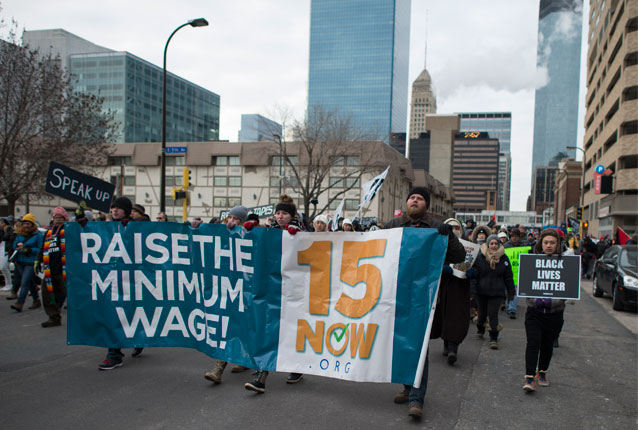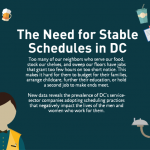Today, Senators Bernie Sanders (I-Vt.), Patty Murray (D-Wash.), and Reps. Bobby Scott (D. Va.), and Keith Ellison (D. Minn.), along with their colleagues, introduced legislation to boost the federal minimum wage to $15 an hour. The “Raise the Wage Act” would gradually increase the minimum wage from current floor of $7.25 to $15 by 2024. It also would phase out the federal subminimum tipped wage, which remains at a paltry $2.13 per hour.
This bill is the culmination of years-long efforts by the One Fair Wage and Fight for $15 movements and their supporters. It would level the playing field for millions of working people across the country. In 2016, the Bureau of Labor Statistics estimated that more than 2.1 million Americans were paid at or below the federal minimum.
Early on, critics called a $15 minimum wage “ludicrous and absurd.” But working people know it’s ludicrous that Congress hasn’t raised the federal minimum wage in more than ten years. And it’s absurd that so many hard-working Americans are barely making it on “starvation wages” of way less than $15 an hour.
Anita Owens is one such example. With nine years of experience as a home healthcare provider in South Bend, IN, she only nets $9.50 an hour. Granted, it’s more than the current minimum wage, but still not enough to cover expenses or care for her elderly mother. Even with taking on an extra job, Anita still can’t afford a doctor’s visit or checkup, or to buy nutritious foods. The Raise the Wage Act would make life healthier for Anita, and others in her situation.
Genevieve Sneed, a 62-year-old from Memphis, TN, also is struggling to get by. She shared, “I’ve worked as a homecare worker for 40 years, helping seniors and people with disabilities with their daily needs, from bathing, cleaning, using the bathroom, and cooking, to administering medication and wound care. I started by caring full-time for my brother, who has a severe disability, after my mother passed away. I’ve devoted my life to caring for others, and my job is skilled – it requires patience, compassion, and training. Yet I’ve never been paid more than $9 an hour.”
This struggle spurred Genevieve to join the Fight for $15 movement, “because a living wage will keep good people in good jobs. I fight for myself and for the future home care workers coming behind me.”
While the cost of gas, food, and rent increases every year, countless men and women find themselves stuck making the same meager wages. According to the National Employment Law Project, our nation’s economy and productivity have more than doubled since the 1960s, but Congress has not raised the minimum wage at the same rate. People earning a minimum wage today are paid less per hour than their counterparts earned back then. It only makes sense that the lowest paid person in America today should earn more than the lowest paid person 50 years ago.
Nelson Robinson has close to 20 years of experience in the airline industry. He used to earn a family-supporting income working the ramps and handling baggage claim and cargo. Unable to find work for two and a half years after his airline laid him off after September 11, 2001, he swallowed his pride and took a job in airline catering. The pay difference was significant – he now earns only $8.25 an hour.
Nelson revealed, “I had to make tough decisions to support my family. It’s hard working in airline catering because the pay is so low. You want to do stuff for your family, but the pay doesn’t allow it. If I made $15 an hour, my life and my family’s life would be very different. I wouldn’t have to work so many hours of overtime just to make ends meet. I could actually attend some of my kids’ events. I have two daughters, one does cheerleading and the other plays soccer. My work helps the airlines make so much money, yet I can barely scrape by.”
While wealthy corporations and CEO’s profit, many women and men working in growing industries like home health care, food service, and hospitality, aren’t able to meet their family’s basic needs. When he announced plans to introduce the Raise the Wage Act, Sen. Bernie Sanders argued that “there is something profoundly wrong when we have a president, and we have Republican congressional leaders, who are working overtime for tax breaks for billionaires, but they have nothing to say about raising the minimum wage.”
Anita, Genevieve, and Nelson represent the millions of individuals who want to earn sensible pay and achieve a sustainable standard of living. A $15 across the board raise would mean a fair return on work for so many working Americans striving to get by. The Raise the Wage Act sends a clear message that no matter where you live or work in this country, you should be able to provide for yourself and your family.







